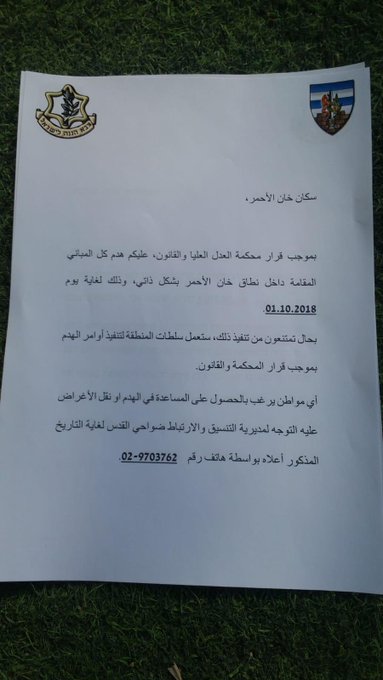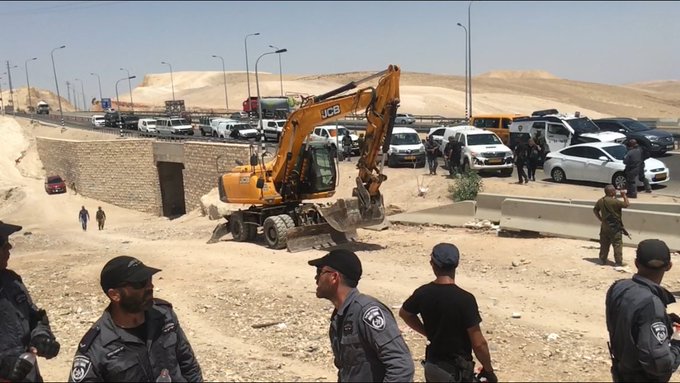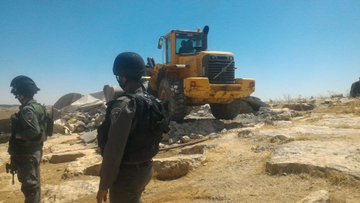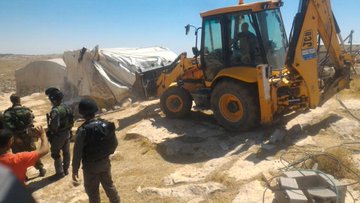British firm JCB helps Israel commit war crimes

A JCB bulldozer, guarded by Israeli occupation forces, is used to uproot olive trees on private Palestinian land near Nabi Elias in the occupied West Bank in order to build a road for Israeli settlers, 16 January 2017.
ActiveStills
Adri Nieuwhof-29 September 2018
Occupation authorities have given residents of the Palestinian village of Khan al-Ahmar until 1 October to demolish their own homes.
Earlier this month Israel’s highest court gave final approval to destroy the West Bank village to make way for Israeli settlements.
If the residents don’t comply, Israel is expected to send in its bulldozers any day. It is almost certain they will include machines made by British firm JCB, whose equipment has been used for years to demolish Palestinian property in the occupied West Bank.
Destruction of Khan al-Ahmar would be a war crime under international law, and JCB executives are being warned they could face criminal liability for their role.
Last July, JCB equipment was spotted in the Bedouin villages of Khan al-Ahmar and Abu Nuwwar near East Jerusalem.
British Palestine solidarity activists blocked the entrance to the JCB distribution center in Derby this month to protest the company’s involvement in the demolitions of Palestinian homes.
Half of the almost 200 residents of Khan al-Ahmar are children and teenagers.
JCB’s claim that it wants “to help build a better future for our children, where hard work and dedication are given their just reward” must taste bitter for these youth.
JCB and Khan al-Ahmar
On 4 July, BBC correspondent Tom Bateman tweeted a photo of Israeli forces using a JCB excavator to clear the way for the forcible evacuation of Khan al-Ahmar.
London-based Lawyers for Palestinian Human Rights immediately wrote to UK Foreign Office minister Alistair Burt urging the government to intervene and charging that JCB’s involvement in the pending demolition of Khan al-Ahmar “may amount to aiding and abetting a war crime.”
Labour Party lawmaker Paula Sherriff raised the issue in Parliament and Burt assured her that an investigation into the use of JCB machinery in the demolition of Khan al-Ahmar would be carried out.
But European governments have a history of prioritizing trade with Israel over respect for international law, and no history of imposing costs on Israel or on the companies that assist its violations.
European Union diplomats have limited their response to toothless statements and symbolic visits.
In August, Lawyers for Palestinian Human Rights also wrote to JCB asserting that “involvement in the demolition process of Khan al-Ahmar may amount to aiding and abetting the war crime of forcible transfer.”
JCB has not responded to an invitation from the Business and Human Rights Resource Centre, a corporate accountability watchdog, to answer the allegations in the letter.
A record of destruction
Six years ago, the British campaign group War on Want published a report detailing Israel’s use of JCB machines to destroy Palestinian homes, mosques and olive trees and to build settlements in the West Bank, all of which are illegal under international law.
Since then, the use of JCB machines has been documented repeatedly during Israel’s violations of Palestinian rights:
- 25 July 2018: A JCB bulldozer was used in the demolition of an EU-funded daycare facility that served dozens of children and a women’s community center in Jabal al-Baba village near East Jerusalem in the occupied West Bank.
- 4 July 2018: Israeli forces demolished nine Palestinian homes and three farm buildings in the Abu Nuwwar community near East Jerusalem with JCB equipment, leaving 62 people homeless.
- 12 February 2018: Israeli forces used a JCB machine to flatten the home of 58-year-old Rezeq Abu Nasser in the village of Deir Istiya, east of Qalqiliya. The Israelis told Abu Nasser in Hebrew that he had five minutes to collect his belongings, which was not sufficient to save his possessions. Abu Rezeq’s home is in an area of the occupied West Bank that Israel declared a “nature reserve” – a tactic long used to stop Palestinians from building on their own land.
- 18 June 2017: A photo published by The Times of Israel shows a JCB machine being used in the construction of the settlement of Maaleh Amos, in the occupied West Bank.
- 6 February 2017: JCB equipment was used in the construction of a settler road in the occupied West Bank village of Nabi Elias.
- 16 January 2017: Israeli occupation authorities used JCB equipment to uproot dozens of olive trees for construction of a settler road near Qalqiliya.
- 19 June 2016: Israeli forces demolished Palestinian property in Susiya village, in the South Hebron Hills area of the occupied West Bank, with JCB and Volvo equipment.
- 5 January 2015: JCB equipment was documented being used for construction in the West Bank settlement of Ariel.
“Criminal liability”
JCB’s corporate leaders cannot have failed to notice Israel’s use of their products in its systematic violations of Palestinian rights.
As Lawyers for Palestinian Rights has spelled out, the provision of JCB’s products for use by Israel in these and other acts is contrary to the human rights responsibilities businesses have under the United Nations Guiding Principles on Business and Human Rights and the OECD Guidelines for Multinational Enterprises.
That is why Palestine solidarity activists have initiated a campaign in the UK to hold JCB accountable .
Lawyers for Palestinian Human Rights gave JCB chair Anthony Bamford and CEO Graeme MacDonald fair warning that their firm’s involvement in the imminent demolition of Khan al-Ahmar could “incur the criminal liability of individuals within the company.”





 EU Heads of Mission in Jerusalem and Ramallah visited today Khan Al Ahmar and the Tire School. They met with Abu Khamis, community representative, and other
EU Heads of Mission in Jerusalem and Ramallah visited today Khan Al Ahmar and the Tire School. They met with Abu Khamis, community representative, and other  Palestinians who stand in...
Palestinians who stand in... 
